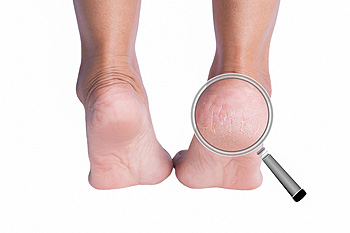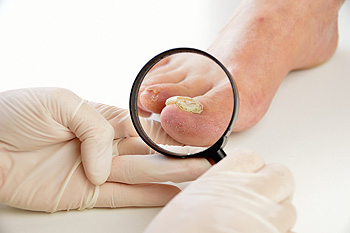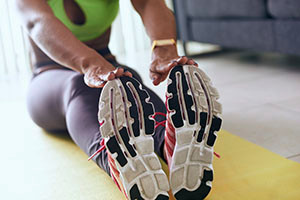 There are a variety of factors that can lead to pain in the arch of the foot. While a structural imbalance or an injury can cause the pain, plantar fasciitis is the most common culprit. Plantar fasciitis is caused by the inflammation of the plantar fascia, which is tissue that connects the heel to the toes. Because stretching the plantar fascia pulls on the heel bone, the arch pain may lead to heel pain as well. Plantar fasciitis can also lead to a heel spur. Patients who are experiencing pain in the arch of the foot should visit a podiatrist, as pain from plantar fasciitis can worsen over time. Patients should also avoid wearing high heels, and opt for shoes that have extra cushioning and good arch support.
There are a variety of factors that can lead to pain in the arch of the foot. While a structural imbalance or an injury can cause the pain, plantar fasciitis is the most common culprit. Plantar fasciitis is caused by the inflammation of the plantar fascia, which is tissue that connects the heel to the toes. Because stretching the plantar fascia pulls on the heel bone, the arch pain may lead to heel pain as well. Plantar fasciitis can also lead to a heel spur. Patients who are experiencing pain in the arch of the foot should visit a podiatrist, as pain from plantar fasciitis can worsen over time. Patients should also avoid wearing high heels, and opt for shoes that have extra cushioning and good arch support.
Foot Pain
Foot pain can be extremely painful and debilitating. If you have a foot pain, consult with Brent Harwood, DPM from Southeast Podiatry. Our doctor will assess your condition and provide you with quality foot and ankle treatment.
Causes
Foot pain is a very broad condition that could be caused by one or more ailments. The most common include:
Diagnosis
To figure out the cause of foot pain, podiatrists utilize several different methods. This can range from simple visual inspections and sensation tests to X-rays and MRI scans. Prior medical history, family medical history, and any recent physical traumatic events will all be taken into consideration for a proper diagnosis.
Treatment
Treatment depends upon the cause of the foot pain. Whether it is resting, staying off the foot, or having surgery; podiatrists have a number of treatment options available for foot pain.
If you have any questions, please feel free to contact one of our offices located in Fairhope, Brewton, and Atmore, AL . We offer the newest diagnostic and treatment technologies for all your foot care needs.
 Swollen feet are a common result of pregnancy. While the fetus puts extra weight on the feet and legs, circulation also slows and fluid can build up. This ultimately leads to the feet swelling. Pregnant women whose feet have swollen should avoid standing for long periods of time, slightly elevate the feet, limit salt intake, keep hydrated, wear comfortable shoes and socks, and massage the feet regularly. While foot swelling is normal during pregnancy, a sudden or rapid increase in swelling should be checked by a podiatrist. It is also important to seek medical attention if one foot is more swollen than the other, there is pain or heat in the calf, or the skin is red or discolored.
Swollen feet are a common result of pregnancy. While the fetus puts extra weight on the feet and legs, circulation also slows and fluid can build up. This ultimately leads to the feet swelling. Pregnant women whose feet have swollen should avoid standing for long periods of time, slightly elevate the feet, limit salt intake, keep hydrated, wear comfortable shoes and socks, and massage the feet regularly. While foot swelling is normal during pregnancy, a sudden or rapid increase in swelling should be checked by a podiatrist. It is also important to seek medical attention if one foot is more swollen than the other, there is pain or heat in the calf, or the skin is red or discolored.
Pregnant women with swollen feet can be treated with a variety of different methods that are readily available. For more information about other cures for swollen feet during pregnancy, consult with Brent Harwood, DPM from Southeast Podiatry. Our doctor will attend to all of your foot care needs.
What Foot Problems Can Arise During Pregnancy?
One problem that can occur is overpronation, which occurs when the arch of the foot flattens and tends to roll inward. This can cause pain and discomfort in your heels while you’re walking or even just standing up, trying to support your baby.
Another problem is edema, or swelling in the extremities. This often affects the feet during pregnancy but tends to occur in the later stages.
How Can I Keep My Feet Healthy During Pregnancy?
If you have any questions please feel free to contact one of our offices located in Fairhope, Brewton, and Atmore, AL . We offer the newest diagnostic and treatment technologies for all your foot care needs.
Read more about Pregnancy and Foot Health A foot condition that can cause pain, discomfort, and an unsightly appearance can be described as cracked heels. It can occur as a result of wearing shoes that have an open back, or possibly from specific medical conditions. These can include thyroid disorders, diabetes, or kidney concerns. Additionally, people who are overweight may experience cracked heels from the excess weight and pressure the heels endure. Mild relief may be found when the feet are soaked in warm water, followed by applying a good moisturizer on them. Research has indicated it may help to add a vitamin regime into your daily routine, in addition to drinking plenty of fresh water. If you have cracked heels, it is suggested that you confer with a podiatrist who can offer effective treatment options.
A foot condition that can cause pain, discomfort, and an unsightly appearance can be described as cracked heels. It can occur as a result of wearing shoes that have an open back, or possibly from specific medical conditions. These can include thyroid disorders, diabetes, or kidney concerns. Additionally, people who are overweight may experience cracked heels from the excess weight and pressure the heels endure. Mild relief may be found when the feet are soaked in warm water, followed by applying a good moisturizer on them. Research has indicated it may help to add a vitamin regime into your daily routine, in addition to drinking plenty of fresh water. If you have cracked heels, it is suggested that you confer with a podiatrist who can offer effective treatment options.
If the skin on your feet starts to crack, you may want to see a podiatrist to find treatment. If you have any concerns, contact Brent Harwood, DPM from Southeast Podiatry. Our doctor can provide the care you need to keep you pain-free and on your feet.
Cracked Heels
It is important to moisturize your cracked heels in order to prevent pain, bleeding, and infection. The reason cracked heels form is because the skin on the foot is too dry to support the immense pressure placed on them. When the foot expands, the dry skin on the foot begins to split.
Ways to Help Heal Them
Ways to Prevent Cracked Heels
If you are unsure how to proceed in treating cracked heels, seek guidance from a podiatrist. Your doctor will help you with any questions or information you may need.
If you have any questions, please feel free to contact one of our offices located in Fairhope, Brewton, and Atmore, AL . We offer the newest diagnostic and treatment technologies for all your foot care needs.
Read more about Solutions for Cracked Heels A fungal infection of the toenails is known as onychomycosis, and it is considered to be contagious. Toenail fungus often affects up to ninety percent of elderly people. The type of fungus that causes this ailment lives and thrives in warm and moist environments. These can consist of public swimming pools, shower room floors, and surrounding areas. It is beneficial to wear appropriate shoes while in these places, and this may help to control outbreaks of toenail fungus. Common symptoms that are typically associated with this condition can include a thickening and yellowing of the toenails, often starting with the big toe. In severe cases, the nail may become brittle and lift off of the nail bed. If you have toenail fungus, please confer with a podiatrist who can recommend correct treatment options for you.
A fungal infection of the toenails is known as onychomycosis, and it is considered to be contagious. Toenail fungus often affects up to ninety percent of elderly people. The type of fungus that causes this ailment lives and thrives in warm and moist environments. These can consist of public swimming pools, shower room floors, and surrounding areas. It is beneficial to wear appropriate shoes while in these places, and this may help to control outbreaks of toenail fungus. Common symptoms that are typically associated with this condition can include a thickening and yellowing of the toenails, often starting with the big toe. In severe cases, the nail may become brittle and lift off of the nail bed. If you have toenail fungus, please confer with a podiatrist who can recommend correct treatment options for you.
For more information about treatment, contact Brent Harwood, DPM of Southeast Podiatry. Our doctor can provide the care you need to keep you pain-free and on your feet.
Toenail Fungus Treatment
Toenail fungus is a condition that affects many people and can be especially hard to get rid of. Fortunately, there are several methods to go about treating and avoiding it.
Antifungals & Deterrence
Oral antifungal medicine has been shown to be effective in many cases. It is important to consult with a podiatrist to determine the proper regiment for you, or potentially explore other options.
Applying foot powder on the feet and shoes helps keep the feet free of moisture and sweat.
Sandals or open toed shoes – Wearing these will allow air movement and help keep feet dry. They also expose your feet to light, which fungus cannot tolerate. Socks with moisture wicking material also help as well.
If you have any questions please feel free to contact one of our offices located in Fairhope, Brewton, and Atmore, AL . We offer the newest diagnostic tools and technology to treat your foot care needs.
Read more about Toenail Fungus The feet are a complex part of the body that contains 25% of our bones. Because the average 50-year-old has walked 75,000 miles, it is important to keep the feet strong and healthy to prevent pain and diseases from impacting them. Common skin-related issues on the feet include fungal nail infections, corns, calluses, warts, ingrown toenails and athlete’s foot. Common muscle, tendon and joint problems include hammertoe, heel spurs, plantar fasciitis, bunions and arthritis. In order to prevent these issues, proper foot care is important. Regularly washing the feet, wearing clean socks, and making sure your feet are dry are key steps to helping prevent skin-related issues. Wearing comfortable shoes that fit correctly, stretching and massaging the feet, and moving around after sitting for long periods of time are also important in reducing the risk of foot problems. The biggest key to foot health, however, is knowing when to see a podiatrist. If your foot pain is inhibiting your ability to walk and function, or you are diabetic and notice new issues with your feet, it is important to seek the care of a podiatrist.
The feet are a complex part of the body that contains 25% of our bones. Because the average 50-year-old has walked 75,000 miles, it is important to keep the feet strong and healthy to prevent pain and diseases from impacting them. Common skin-related issues on the feet include fungal nail infections, corns, calluses, warts, ingrown toenails and athlete’s foot. Common muscle, tendon and joint problems include hammertoe, heel spurs, plantar fasciitis, bunions and arthritis. In order to prevent these issues, proper foot care is important. Regularly washing the feet, wearing clean socks, and making sure your feet are dry are key steps to helping prevent skin-related issues. Wearing comfortable shoes that fit correctly, stretching and massaging the feet, and moving around after sitting for long periods of time are also important in reducing the risk of foot problems. The biggest key to foot health, however, is knowing when to see a podiatrist. If your foot pain is inhibiting your ability to walk and function, or you are diabetic and notice new issues with your feet, it is important to seek the care of a podiatrist.
Everyday foot care is very important to prevent infection and other foot ailments. If you need your feet checked, contact Brent Harwood, DPM from Southeast Podiatry. Our doctor can provide the care you need to keep you pain-free and on your feet.
Everyday Foot Care
Often, people take care of their bodies, face and hair more so than they do for their feet. But the feet are a very important aspect of our bodies, and one that we should pay more attention to. Without our feet, we would not be able to perform most daily tasks.
It is best to check your feet regularly to make sure there are no new bruises or cuts that you may not have noticed before. For dry feet, moisturizer can easily be a remedy and can be applied as often as necessary to the affected areas. Wearing shoes that fit well can also help you maintain good foot health, as well as making it easier to walk and do daily activities without the stress or pain of ill-fitting shoes, high heels, or even flip flops. Wearing clean socks with closed shoes is important to ensure that sweat and bacteria do not accumulate within the shoe. Clean socks help to prevent Athlete’s foot, fungi problems, bad odors, and can absorb sweat.
If you have any questions please feel free to contact one of our offices located in Fairhope, Brewton, and Atmore, AL . We offer the newest diagnostic and treatment technologies for all your foot care needs.
Read more about Everyday Foot Care Implementing methods that can help to prevent running injuries is crucial to thoroughly enjoying the sport of running or jogging. Good habits can consist of warming up and cooling down before and after running, and it is beneficial to wear shoes that fit correctly. Additionally, it helps to gradually increase speed and mileage, as this can build endurance over time. Professional runners state it is best to increase the miles that are run by 10 percent or less per week. If you would like more information about foot conditions that can occur from running, running injuries, and how to prevent them, please consult with a podiatrist.
Implementing methods that can help to prevent running injuries is crucial to thoroughly enjoying the sport of running or jogging. Good habits can consist of warming up and cooling down before and after running, and it is beneficial to wear shoes that fit correctly. Additionally, it helps to gradually increase speed and mileage, as this can build endurance over time. Professional runners state it is best to increase the miles that are run by 10 percent or less per week. If you would like more information about foot conditions that can occur from running, running injuries, and how to prevent them, please consult with a podiatrist.
Exercising your feet regularly with the proper foot wear is a great way to prevent injuries. If you have any concerns about your feet, contact Brent Harwood, DPM of Southeast Podiatry. Our doctor will treat your foot care needs.
How to Prevent Running Injuries
Many common running injuries are caused by overuse and overtraining. When the back of the kneecap starts wearing out and starts causing pain in your knee, this is commonly referred to as runner’s knee. Runner’s knee is a decrease in strength in your quadriceps and can occur if you’re not wearing properly fitted or supporting shoes. To prevent runner’s knee, focusing on hip strengthening is a good idea, as well as strengthening your quads to keep the kneecaps aligned.
What Are Some Causes of Running Injuries?
- One cause of a common running injury is called iliotibial band syndrome.
- Plantar fasciitis is also another common injury.
- Stress fractures can occur from overtraining, lack of calcium, or even your running style.
Best Ways to Prevent Running Injuries
- Wear footwear that fits properly and suits your running needs.
- Running shoes are the only protective gear that runners have to safeguard them from injury.
- Make a training schedule. Adding strengthening exercises as well as regular stretching can help keep you strong and limber and can lessen the possibility of injuries.
- Stretching keeps muscles limber; this will help you gain better flexibility.
If you have any questions please feel free to contact one of our offices located in Fairhope, Brewton, and Atmore, AL . We offer the newest diagnostic and treatment technologies for all your foot care needs.
Read more about How to Prevent Running Injuries Hammertoe is a noticeable foot condition that many people experience. It is characterized by an upward bend in the middle joint of the second or third toe, and can often cause difficulty in wearing shoes. This ailment can be prompted by having certain medical conditions, such as diabetes. Additionally, many patients develop hammertoe from wearing shoes that do not have adequate room for the toes to move freely in. Mild relief may be found when specific stretches are performed on the toes, and it may help to wear protective pads on top of the affected toes. If you have hammertoe, please consult with a podiatrist. A podiatrist can offer treatment options which may include surgery that can permanently straighten the toe.
Hammertoe is a noticeable foot condition that many people experience. It is characterized by an upward bend in the middle joint of the second or third toe, and can often cause difficulty in wearing shoes. This ailment can be prompted by having certain medical conditions, such as diabetes. Additionally, many patients develop hammertoe from wearing shoes that do not have adequate room for the toes to move freely in. Mild relief may be found when specific stretches are performed on the toes, and it may help to wear protective pads on top of the affected toes. If you have hammertoe, please consult with a podiatrist. A podiatrist can offer treatment options which may include surgery that can permanently straighten the toe.
Hammertoes can be a painful condition to live with. For more information, contact Brent Harwood, DPM of Southeast Podiatry. Our doctor will answer any of your foot- and -related questions.
Hammertoe
Hammertoe is a foot deformity that occurs due to an imbalance in the muscles, tendons, or ligaments that normally hold the toe straight. It can be caused by the type of shoes you wear, your foot structure, trauma, and certain disease processes.
Symptoms
Risk Factors
Treatment
If you have hammertoe, you should change into a more comfortable shoe that provides enough room for your toes. Exercises such as picking up marbles may strengthen and stretch your toe muscles. Nevertheless, it is important to seek assistance from a podiatrist in order to determine the severity of your hammertoe and see which treatment option will work best for you.
If you have any questions, please feel free to contact one of our offices located in Fairhope, Brewton, and Atmore, AL . We offer the newest diagnostic and treatment technologies for all your foot care needs.
Read more about What Are Hammertoes?